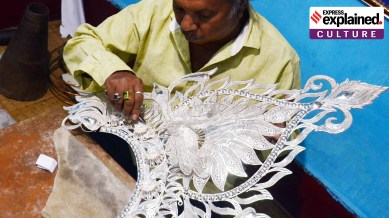What is Cuttack’s famed silver filigree work, which recently received GI tag
A GI tag is conferred upon products originating from a specific geographical region, signifying unique characteristics and qualities. The Odisha State Cooperative Handicrafts Corporation Limited had applied for the tag for Cuttack's 'rupa tarakasi' work.

The famous Rupa Tarakasi, or silver filigree work of Odisha’s Cuttack, has received the geographical indication (GI) tag.
The Odisha State Cooperative Handicrafts Corporation Limited (Utkalika) had applied for the tag.
A GI tag is conferred upon products originating from a specific geographical region, signifying unique characteristics and qualities. Essentially, it serves as a trademark in the international market.
Rupa Tarakasi
Odisha’s Cuttack is known for its silver filigree work, of intricate design and fine craftsmanship. In Odia, “tara” means wire and “kasi” means to design. Thus, as part of Rupa Tarakasi, silver bricks are transformed into thin fine wires or foils and used to create jewellery or showpieces.
Origin
While the exact origin of the filigree art in Cuttack is not clear, it is known to have existed as far back as the 12th century. The art form received considerable patronage under the Mughals. Over the years, as Cuttack transitioned through the hands of different rulers, the silver filigree took on a new form with each.
History
Document submitted by the Odisha government before the GI registry said: “The silver filigree work in which the people of Cuttack have attained such surprising skill and delicacy is identical in character with that of Arabia, Malta, Genoa, Norway, Sweden and Denmark, and with the filigree work of ancient Greece, Byzantium, and Etruria, and was probably carried into the West by the Phoenicians and Arabs, and into Scandinavia by the Normans and in the course also of the medieval trade between Turkestan and Russia.
In Cuttack the work is generally done by boys, whose sensitive fingers, and keener sight enable them to put the fine silver threads together with the necessary rapidity and accuracy. The filigree work is quite distinct in character from the indigenous silver jewellery of the country.”
Popular product categories
The popular product categories now found in Cuttack are jewellery, decorative artifacts, accessories, home décor and religious/cultural pieces. The iconic items found only in Cuttack are the Durga Puja Medha (silver decorations for the Durga idol and pandal), Odissi jewellery, religious/cultural pieces linked directly to the customs of Odisha, and the Dama chain.
Evolution and growth
While silver filigree as a craft has transitioned over time, its core process has stayed the same over the centuries, with only a few changes in tools and components. The majority of the change has come on the design and product fronts.
While different grades of silver are used in the main metal alloy, the craftsmen also use other metals like copper, zinc, cadmium and tin.